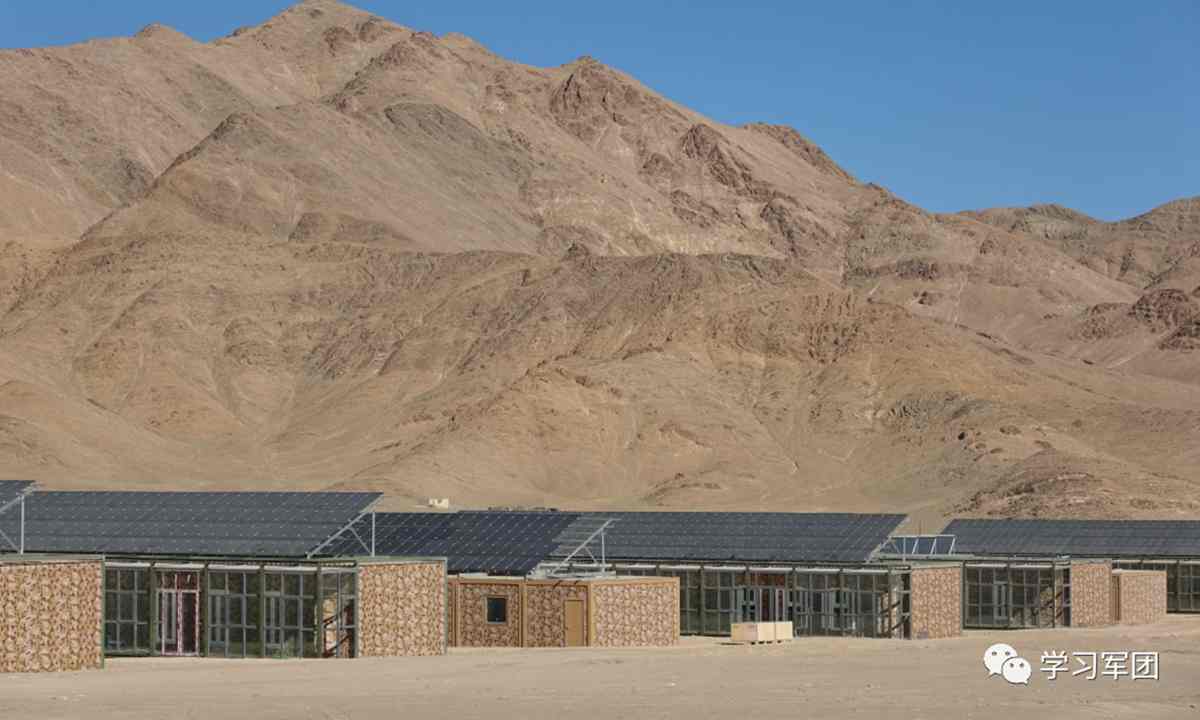


Photo: Xuexijuntuan
Chinese border troops stationed in plateau areas were recently equipped with ready-to-assemble thermal shelters, a guarantee they can get through the chilly winter and support the military's combat readiness in extreme weather.
The use of thermal shelters comes amid the ongoing border tension between China and India, with experts saying it can provide the Chinese military with reliable combat-readiness support in a long-term standoff during the harsh winter.
Developed by the Army Engineering University of the Chinese People's Liberation Army (PLA), the shelters - composed of dormitories, canteens, washing rooms, toilets, warehouses, microgrids and heating equipment - can function properly in temperatures as low as -55 C and at an altitude of 5,500 meters.
The self-powered thermal insulation houses have already been used in outposts in plateau and alpine areas in the past two years, and border troops on the plateau are now officially equipped with them, according to the PLA Daily, citing the logistics support department of the Central Military Commission.
The prolonged standoff in the Chinese-Indian border region is a battle of endurance, logistical support and morale of soldiers, as tensions have shown no signs of easing, Qian Feng, director of the research department at the National Strategy Institute of Tsinghua University in Beijing, told the Global Times on Wednesday.
"This announcement of the use of the shelters will greatly raise the morale of PLA soldiers in the border regions and boost their resolution in the standoff," Qian said.
"The deployment of those shelters shows preparation for an all-round military struggle amid the escalating tensions on the China-India border," Song Zhongping, a military expert and commentator, told the Global Times.
The equipment is flexible in its application and can be assembled according to the scale of the troops. The deployment of the shelters enables troops to carry out any missions as they can be put into use at any time, largely reducing the reliance on long-distance fuel distribution, according to the PLA Daily.
Even without water and electricity, the shelters can be installed normally and their structure and interior space can be adjusted as needed. More than 90 percent of the components can be reused, said the report.
The integrated photovoltaic microgrid can achieve energy self-sufficiency. Even with outdoor temperatures at -40 C, the indoor temperature can be maintained at above 15 C. Diesel heaters can ensure emergency heating in the event of long-term rain and snow.
To adapt to the extreme weather conditions, PLA soldiers on border patrol have also been issued new high-tech clothing, such as cold-proof hoods, warm training clothes and lightweight cold-proof training coats, which can help them better carry out their tasks.
The weather and terrain in Ladakh are major challenges when it comes to large-scale military operations, which require smooth and quick logistical support and medical supplies. Amid the continuing bilateral talks, the border standoff will likely remain the status quo, Qian noted.
China and India are scheduled to hold the 7th military commanders meeting on October 12 in Ladakh.
 Fire brigade in Shanghai holds group wedding
Fire brigade in Shanghai holds group wedding Tourists enjoy ice sculptures in Datan Town, north China
Tourists enjoy ice sculptures in Datan Town, north China Sunset scenery of Dayan Pagoda in Xi'an
Sunset scenery of Dayan Pagoda in Xi'an Tourists have fun at scenic spot in Nanlong Town, NW China
Tourists have fun at scenic spot in Nanlong Town, NW China Harbin attracts tourists by making best use of ice in winter
Harbin attracts tourists by making best use of ice in winter In pics: FIS Alpine Ski Women's World Cup Slalom
In pics: FIS Alpine Ski Women's World Cup Slalom Black-necked cranes rest at reservoir in Lhunzhub County, Lhasa
Black-necked cranes rest at reservoir in Lhunzhub County, Lhasa China's FAST telescope will be available to foreign scientists in April
China's FAST telescope will be available to foreign scientists in April "She power" plays indispensable role in poverty alleviation
"She power" plays indispensable role in poverty alleviation Top 10 world news events of People's Daily in 2020
Top 10 world news events of People's Daily in 2020 Top 10 China news events of People's Daily in 2020
Top 10 China news events of People's Daily in 2020 Top 10 media buzzwords of 2020
Top 10 media buzzwords of 2020 Year-ender:10 major tourism stories of 2020
Year-ender:10 major tourism stories of 2020 No interference in Venezuelan issues
No interference in Venezuelan issues
 Biz prepares for trade spat
Biz prepares for trade spat
 Broadcasting Continent
Broadcasting Continent Australia wins Chinese CEOs as US loses
Australia wins Chinese CEOs as US loses